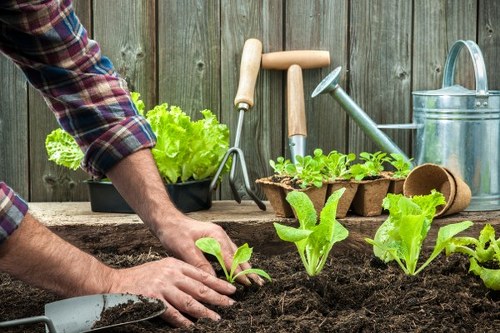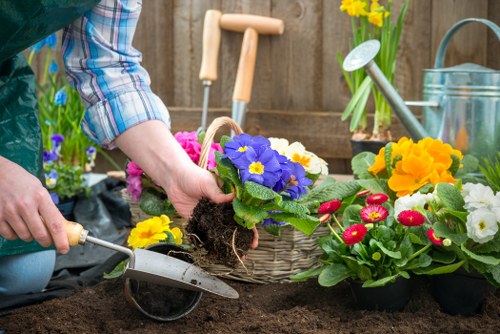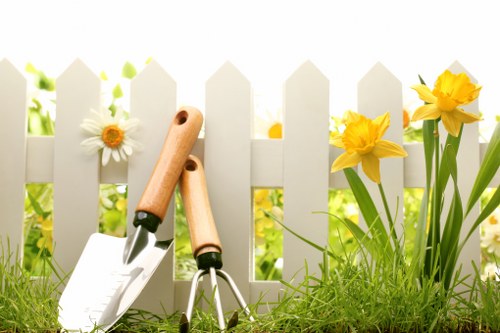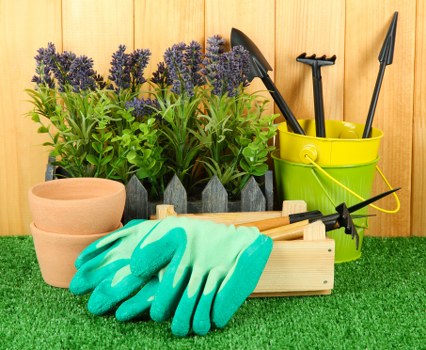Ultimate Guide to Garden Maintenance in Enfield

Introduction to Garden Maintenance
Maintaining a beautiful garden in Enfield requires dedication, knowledge, and the right tools. Whether you are a seasoned gardener or a newbie, understanding the fundamentals of garden maintenance can help you create a thriving outdoor space.
Garden maintenance encompasses a variety of tasks, from watering and weeding to pruning and fertilizing. Each task plays a crucial role in ensuring your garden remains healthy and aesthetically pleasing throughout the seasons.
In Enfield, the climate and soil conditions can affect how you approach garden maintenance. Tailoring your maintenance routine to these local factors will enhance the growth and longevity of your plants.

Seasonal Garden Maintenance Tips
Spring Maintenance
Spring is a vital time for garden maintenance. As the weather warms up, it's essential to prepare your garden for the growing season.
Tasks to focus on:
- Soil preparation and testing
- Planting new flowers and vegetables
- Pruning dead branches
Ensuring your plants have the right nutrients and space to grow sets the foundation for a successful gardening year.

Weed Control Strategies
Weeds can quickly overtake your garden if not managed properly. Effective weed control is essential for maintaining the health and appearance of your garden.
Methods include:
- Manual weeding
- Mulching to suppress weed growth
- Using eco-friendly herbicides
Consistent weed control reduces competition for nutrients and water, allowing your desirable plants to flourish.

Pruning and Trimming
Why Prune?
Pruning is essential for maintaining the shape, health, and productivity of your plants. Regular trimming encourages new growth and prevents diseases.
Remember to use sharp, clean tools to make precise cuts, minimizing damage to your plants.
Proper pruning techniques vary depending on the type of plant, so it's beneficial to research specific needs.

Watering and Irrigation
Water management is a critical aspect of garden maintenance in Enfield. The right watering schedule ensures your plants receive adequate moisture without overwatering.
Tips for efficient watering:
- Water early in the morning to reduce evaporation
- Use drip irrigation systems for targeted watering
- Monitor soil moisture regularly
Implementing smart watering practices conserves water and promotes healthy plant growth.
Fertilization and Soil Health
Maintaining soil fertility is crucial for robust plant growth. Regular fertilization replenishes essential nutrients that plants need to thrive.
Types of fertilizers:
- Organic fertilizers like compost and manure
- Chemical fertilizers for immediate nutrient boost
- Slow-release fertilizers for sustained nourishment
Testing your soil can help determine the best fertilization strategy for your garden.
Lawn Care in Enfield
A well-maintained lawn enhances the overall appearance of your garden. Regular mowing, aeration, and feeding are key components of lawn care.
Lawn maintenance tips:
- Mow at the right height for your grass type
- Aerate soil annually to improve root growth
- Apply appropriate fertilizers and weed control measures
Consistent lawn care ensures a lush and green grassy area for relaxation and play.
Dealing with Pests and Diseases
Protecting your garden from pests and diseases is vital for plant health. Early detection and effective treatment can prevent widespread damage.
Common garden pests in Enfield:
- Aphids and other sap-sucking insects
- Slugs and snails
- Fungal diseases like powdery mildew
Using integrated pest management (IPM) strategies can help control pests while minimizing environmental impact.
Mulching for Garden Health
Mulching offers numerous benefits, including moisture retention, temperature regulation, and weed suppression. It's a simple yet effective garden maintenance practice.
Types of mulch:
- Organic mulches such as bark, straw, and compost
- Inorganic mulches like gravel and rubber
- Living mulches with ground-cover plants
Choosing the right type of mulch depends on your garden's specific needs and aesthetic preferences.
Pathways and Garden Structures
Maintaining pathways and garden structures like fences and pergolas adds functionality and charm to your garden. Regular upkeep ensures these features remain safe and attractive.
Maintenance tasks include:
- Cleaning and repairing pathways
- Painting or staining wooden structures
- Inspecting for and fixing any structural damages
Well-maintained structures enhance the usability and beauty of your garden space.
Seasonal Planting Strategies
Strategic planting according to season can optimize garden productivity and aesthetics. Understanding which plants thrive in each season helps in planning your garden layout.
Planting suggestions:
- Spring: Tulips, daffodils, and early vegetables
- Summer: Roses, sunflowers, and heat-tolerant vegetables
- Autumn: Chrysanthemums, asters, and root vegetables
Rotating plants and selecting season-appropriate varieties ensures a vibrant garden year-round.
Garden Tools and Equipment
Having the right tools is essential for efficient garden maintenance. Quality tools make tasks easier and more effective.
Essential garden tools:
- Pruners and shears
- Watering cans and hoses
- Spades, hoes, and rakes
Maintaining your tools by keeping them clean and sharp extends their lifespan and improves your gardening experience.
Creating a Garden Maintenance Schedule
Organizing your garden tasks with a maintenance schedule ensures nothing is overlooked. A structured plan helps manage time efficiently and maintain consistency.
Steps to create a schedule:
- List all maintenance tasks
- Assign tasks to specific times of the year
- Regularly review and adjust the schedule as needed
A well-planned schedule keeps your garden in peak condition year-round.
Sustainable Garden Practices
Adopting sustainable practices in your garden reduces environmental impact and promotes long-term health of your plants.
Sustainability tips:
- Use organic fertilizers and pesticides
- Implement rainwater harvesting
- Choose native plants that require less maintenance
Embracing sustainability enhances the resilience and beauty of your Enfield garden.
Professional Garden Maintenance Services
While DIY maintenance is rewarding, professional services can provide expertise and save time. Hiring experts ensures comprehensive care for your garden.
Benefits of professional services:
- Expert knowledge of local plant species
- Access to specialized tools and equipment
- Customized maintenance plans
Consider consulting with local garden maintenance professionals to enhance your garden's health and appearance.
Conclusion
Effective garden maintenance in Enfield involves a combination of regular tasks, strategic planning, and sustainable practices. By following these guidelines, you can cultivate a vibrant and healthy garden that brings joy and beauty to your home.
Ready to transform your garden? Contact us today and let our experts help you achieve the garden of your dreams.